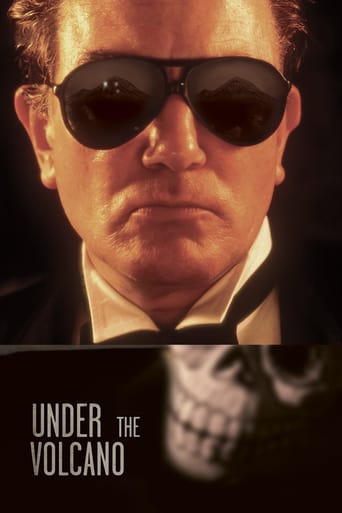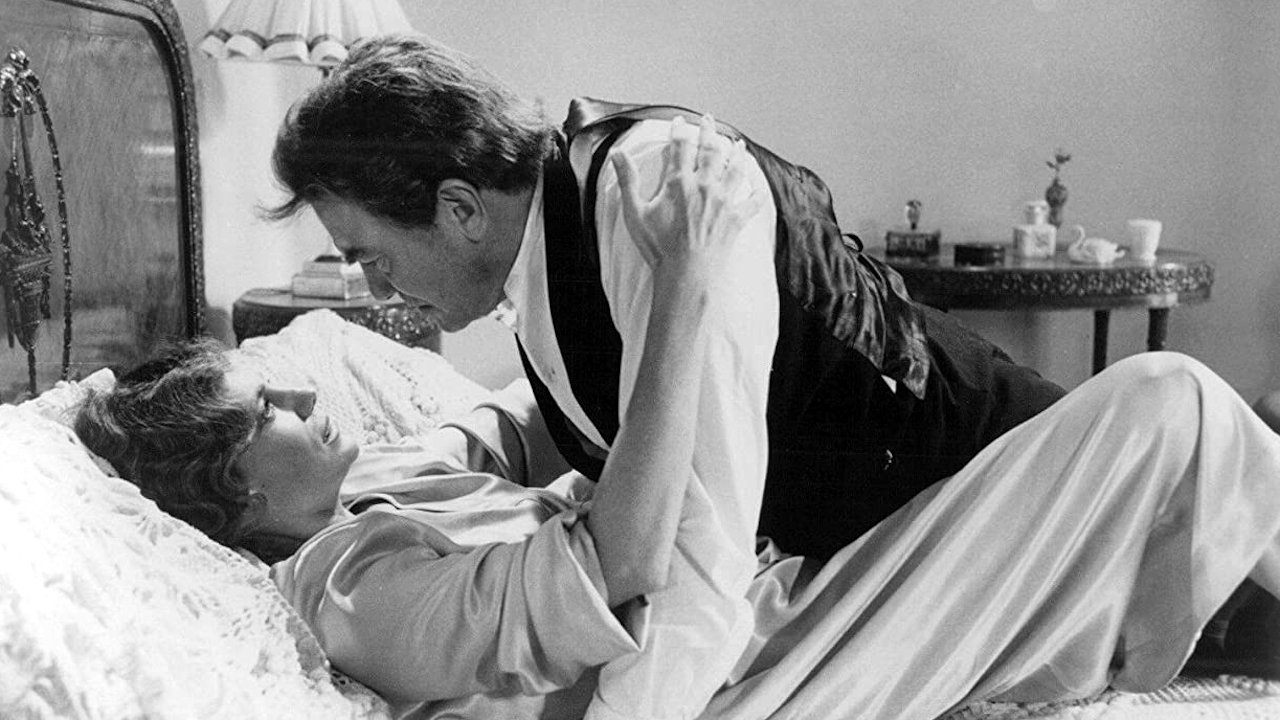elevenangrymen
Geoffrey Firmin, alcoholic ex-British consul to Mexico, is drunk on the day of the dead in Cuevernica Mexico. His wife has left him, his brother is in Mexico City, and he is lonely. He attends a party, where he gives a drunk nonsensical speech, before going to a bar to drink. It is then that his ex-wife arrives, she misses him, and he misses her.He invites her back into their home, where they talk, and Geoffrey drinks. His wife, Yvonne, goes to take a bath, and Geoffrey goes off in search of liquor. His brother Hugh arrives and sees Yvonne, he is surprised to see her. Geoffrey comes back, and asks his wife and brother to come with him to see the sights. Geoffrey constantly interrupts their trip with drinking. Eventually, Geoffrey goes on an alcoholic rampage, and Hugh and Yvonne look for him, as night falls on the day of the dead....The entirety of the film rests on one thing, the performance by Albert Finney. Since Huston's shooting method is to utilize no tricky camera positions, or flashbacks, Finney's performance has to knock it out of the park in order to sell this story. And it does. In the history of film, the character of the drunk has always been an interesting one. Overplay it, and it can seem comedic, underplay it and it can seem non-existent. To strike the perfect balance is hard, and with little nifty camera tricks out of the question, the film rests on the actors performance.It is generally accepted that the three great dramatic drunk male performances were portrayed by Ray Milland in The Lost Weekend, Nicolas Cage in Leaving Las Vegas, and Jack Lemmon in Days Of Wine and Roses. No offense to any to the above, but Finney blows it out of the water. His Geoffrey Firmin is a force of nature. He is so incredibly into character, that halfway through the film I was not thinking in terms of Albert Finney, but in terms of Geoffrey Firmin.He delves into the depths of a character that really isn't that likable, and he doesn't try to make him likable. He plays it like a real drunkard. When he meets a British man after lying on the road, he gets up and begins to mock the man. The man doesn't know of course, but we do. Finney's drunkenness is done to the tee. When Firmin runs out of alcohol he plows through his typical hiding spots in a rage, until moving into the backyard, where he find his bottle. It's a bravura performance.However, Finney is not the only actor who gives a great performance. Jacqueline Bisset, playing Firmin's long suffering wife, gives a wonderful performance. She still loves him, after all of those years, and she thinks she can help him, not knowing he is beyond help. Bisset was quite good in Day For Night, but here she gives a better performance. It's great. The same, however, cannot be said for Anthony Andrews as Hugh Firmin.To be fair, Andrews isn't given the same opportunities as Finney and Bisset, but his character is kind of bland, so it is hard to create a great character out of this. As Huston lived in Mexico, he certainly knew his surroundings, and the cinematographer strikes a great balance between Firmin's surroundings and his drunkenness.I do not like the score, although many people do. I find it sounds almost comedic at points, certainly the wrong kind of atmosphere for this kind of film. The screenplay does a great job of condensing an "unfilmable" novel into a film. Huston's direction is laid back, he lets the story take its course, and lets the actors do their thing. I know why Huston would choose to film in such an uninspiring way, but I do wish he could have made his camera just a little more involved.You can tell he is in control of his film, but it could have been shot in a more involving way. This brings me to my main issue with the film. It is just kind of boring. It moves along at a slow pace, and with characters that are unlikable. This makes it very hard to get into the film. No offense to Huston (or books), the film seems so literary. It never really becomes a film, it feels like an adaptation, all the way down the line.To be fair, that is Huston's style, but I can usually overlook it, most time I don't even realize it, if the plot is interesting. Here the film feels like a showcase for Finney's amazing performance, with the plot being pushed to the side, much as the novel must have been, with Lowry's thoughts instead of Finney's performance. Overall, this is not a bad film. The performances by the two leads are terrific, and it is a fitting third last film for Huston.Under the Volcano, 1984, Starring: Albert Finney, Jacqueline Bisset and Anthony Andrews, Directed by John Huston, 7/10 (B)(This is part of an ongoing project to watch and review every John Huston movie. You can read this and other reviews at http://everyjohnhustonmovie.blogspot.ca/)
shmeedleberg
Although the Yom Kippur pawnshop scene in "The Lost Weekend" was unnerving and stomach-knotting, in my opinion Albert Finney's Consul does real justice to the novel. The timing between the beverages is amazing. For example, the early-morning self-assertion by retelling the German officers story to the disgruntled barkeep, then the ten-minute lapse to his frantic bottle search in the unkempt garden. Towards the film's end he seems in romantic mode. The surrounding story line at times seems almost superficial to this one man's daily existence with booze, and having not seen "Leaving Las Vegas" and unable to comment, "Under The Volcano" ranks as a stellar film about a disturbing subject matter.
mcgemail2004-moviedatabase
Imagine Albert Finney, one of the great ham bones of the acting world. Imagine one of the great ham bones of the acting world playing a character who's drunk for the entire length of the movie. If you can imagine this, you can imagine why the audience applauded when Albert Finney's character finally died because it meant that the movie was apt to be over soon as well. Predictable and self-consciously "arty," the movie never seemed to be about anything, but rather seemed to be a vehicle for Albert Finney to overact (as usual). The plot was non-existent and the characters were stereotypical "strangers in a strange land."
rdconger
I've read the book and I've seen the film, and I can say that the reason the film is so bad is because it is based on the truly execrable novel by Malcolm Lowry. "Under the Volcano" is a novel about a drunk, written by a drunk, apparently while he was drunk. The unreadable, self-indulgent and presumptuous ineptitude of Lowry's novel was, unhappily, accurately reproduced by the film. Albert Finney can always be counted on for a terrific performance, great professional that he is; but any film based on Lowrey's pathetic, rambling narrative would have to be, as this effort was, sadly hampered by its source material.


 AD
AD





